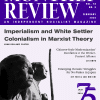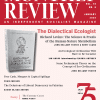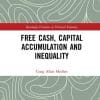
Arghiri Emmanuel and Unequal Exchange: Past, Present, and Future Relevance
Torkil Lauesen delves into the legacy of celebrated Arghiri Emmanuel, whose theory of unequal exchange resonates well into the twenty-first century. Introduced in 1962, Emmanuel’s critique of Ricardian and neoliberal capitalism further illuminated the Marxist concept value as it relates to global exchange and the ongoing exploitation of the Global South by the Global North. | more…

Labor Informality and Unemployment in Brazil: Insights from the Perspective of the Relative Surplus Population
Using data from Brazil’s Integrated System of Household Surveys, Renata Falavina and Gabriel Ulbricht employ Marxist categories in order to illuminate the concept of the reserve army of labor in the context of underemployment and informal labor in modern-day Brazil. This view, the authors write, shows that the dichotomy of full employment and unemployment fails to capture the complexity of unstable labor dynamics in a world of informal and precarious work. | more…

No horn blowing for me
A new poem by Marge Piercy. | more…

Ballade of the Poverties
A classic poem by Adrienne Rich, reprinted. | more…

February 2025 (Volume 76, Number 9)
The editors recall the life and accomplishments of Amiya Kumar Bagchi, a leading light among contemporary Marxist political economists. Bagchi’s insights challenged prevailing Eurocentric ideas about economic history while providing a path forward through a collective, united, anti-imperialist resistance. | more…

Imperialism and White Settler Colonialism in Marxist Theory
Over the last quarter century—and especially since the beginning of Israel’s latest genocidal incursion into Palestine in October 2023—the term “settler colonialism” has proliferated in academic and popular discourse. In February’s “Review of the Month,” John Bellamy Foster connects readers to thinkers from around the globe and across time to illustrate the phenomenon of settler colonialism as a dimension of imperialism, and thus capitalism, driven by a rapacious extractivism that threatens the whole of humanity. | more…

Chinese-Style Modernization: Revolution and the Worker-Peasant Alliance
Since the 1980s, writes Lu Xinyu, a division between industrial and agricultural labor has grown in China, reflected in the fractured relationship between urban and rural areas. China’s successful navigation of the issue, Lu concludes, relies on creating a vigorous alliance between the rural peasantry and urban workers that aids in the ultimate delinking of China from the imperialist, world system. Chinese-style modernization, Lu concludes, represents a path that, while developed in a Chinese context, “represents the aspirations of the Global South to break free from worldwide Western hegemony.” | more…

Emerging Oceanic Struggles for No-Nukes in Japan
In this deeply stirring account, Sit Tsui and Lau Kin Chi share their field research, conducted over years of travel and relationship-building, into the Japanese antinuclear movement. As the people and environment of Fukushima continue to be impacted by the disaster at the Fukushima Daiichi power plant in March 2011, the No-Nukes movement has grown in response, encompassing aspects of society ranging from artists and monks to fisherfolk and intellectuals. | more…

January 2025 (Volume 76, Number 8)
Monthly Review editors take on the results of the 2024 election, exploring how the lackluster reformist policies of the Biden administration and unfocused nature of the Harris campaign served to drive away much of the working class, as reflected in part by the expansion of the Party of Nonvoters. As neoliberal positions occlude the possibility of a Popular Front against Trump’s fascism, any substantive victory must come from a revolutionary restructuring of society. | more…

The Dialectical Ecologist: Richard Levins and the Science and Praxis of the Human-Nature Metabolism
In January’s Review of the Month, John Bellamy Foster and Brett Clark revisit the legacy of scientist and MR author Richard Levins, from his “red diaper” infancy to his agroecological work in Cuba and his contributions to Marxian ecological thinking as a whole. “As a dialectical ecologist,” they write, “Levins proposed that we ask the big questions, as part of understanding why the world came to be organized in a particular way, and how it might be different.” | more…

Free Cash, Mergers, and Capital Spillage
Craig Medlen draws on decades of data to reveal how the creeping stagnation of the past half-century has led to the increasing consolidation of corporate monopoly power and concentration of firms by way of mergers and, importantly, the free cash that funds them. This stunning rise in free cash, fueled in part by government deficits, starkly reveals how the ruling class continues to enrich themselves and strengthen their position on the top of the economic heap. | more…

An Ecological Civilization Will Have to Be Socialist
In this interview with Claudia Antunes of Brazilian magazine Sumaúma, Ian Angus takes stock of our current planetary crisis, from its origins in Marx’s ecological thought and the present debate over its designation to the future of human civilization as we know it. “The key question is,” he concludes, “Are we going to see large number of people moving for change?” | more…

Some Preliminary Theses on the Concept of Eco-Civilization
In this talk given at Peking University in October 2024, John Bellamy Foster shares ten theses describing both the roots and contemporary manifestations of the idea of ecological civilization. Relating the concept’s origins in the writings of Marx and Engels to its expression today in Chinese society, Foster reveals the inherently socialist nature of eco-civilization and the necessity of a worldwide ecological revolution to shift toward sustainable human development. | more…